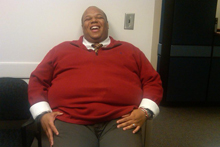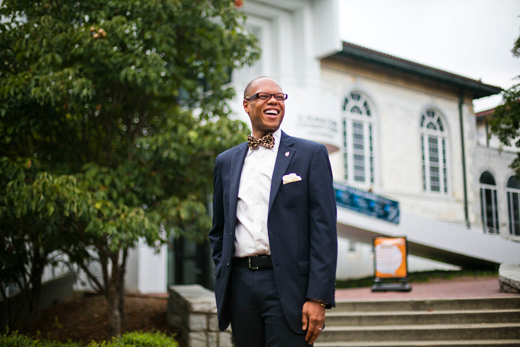On a busy afternoon in Emory's Office of Student Conduct, Marlon Gibson takes a phone call. Listening intently, his expression softens. He smiles.
This time, it's not about the new Greek Conduct Review Board, which he advises; Second Year at Emory, where he is a liaison; or Emory's new Black Student Union, which he co-directs.
It's a woman from Buffalo, N.Y., a stranger who feels as if she knows him after reading an article about Gibson and his remarkable weight loss earlier this month on CNN.com, where his story has drawn more than 2 million views and attracted even more national media coverage.
As the new associate director of Emory's Office of Student Conduct, Gibson helps transform lives through the office's "developmental" philosophy of guiding students to acknowledge and shape their own behaviors.

Beyond transforming student lives, Gibson achieved a personal transformation: a 245-pound weight loss. Photo courtesy of Marlon Gibson.
But transformation has clearly been at work in his own life, too.
Since January 2011, the 5-foot-11-inch Gibson has lost 245 pounds, the equivalent of a standard kitchen refrigerator. The weight loss took him from 405 pounds down to a lean 160 pounds.
No lap-band surgery, miracle supplements, special weight loss programs, or pre-packed meal plans. Just common sense, restraint and hard work in the gym, along with the encouragement of a virtual trainer.
These days, Gibson cuts a trim, stylish figure. Always fashion forward, he no longer has to shop Big and Tall stores to accommodate a 64-inch waistline. Instead, he's a size 28 and training to run in his first half-marathon next month.
Now, not only can his wife Sheree finally put her arms around him, "they wrap around me twice," he jokes.
Emory Report sat down with Gibson to talk about his new role at Emory and finding his way to a healthier life:
How did your weight loss journey begin?
One night, my wife and I were watching "The Biggest Loser," and she started crying. She told me: "That's my biggest fear — you just keep eating." We don't have children yet, but she worried that I wouldn't be around to watch them grow up. A couple weeks later, I went into a Big and Tall store. When I tried on a pair of pants, I cut my finger trying to button them — that's how much effort it took. They had nothing left to fit over a size 64.
Had weight always been a struggle?
I was born and raised in Toledo, Ohio — an only child and an only grandchild, so everyone loved to give me treats. Weight was never a problem for my parents: my mother was a size 6 and my father had a legendary metabolism that allowed him to eat and eat. By the time I was in high school, I was already a size 52.
How did you begin to see a change?
Small steps. At first, I just began to cut back. Instead of eating six pieces of chicken, I would eat four, then two. I stopped going back for seconds on macaroni salad. I decided to spend five minutes at a time on the elliptical (machine), which eventually grew to 65 minutes. When I started taking spin classes, I remember reading the maximum weight capacity on the bikes was 325. I weighed 350. But I got on that bike and haven't gotten off.
I also worked with a virtual trainer (offtrackonpurpose.com), which has helped with accountability. Now, I hit the gym seven days a week and typically work out twice a day. I'm also a vegan and pack my own lunch every day. I know foods that are triggers and avoid them.
How were you drawn to working in student affairs?
I went to Catholic school for 13 years and enjoyed my experience so much that I went to the University of Toledo with plans to become a high school English teacher. I loved everything about my college experience — that's what drew me into working with college students.
By the time I was in graduate school, I'd lost quite a bit of weight and was down to a 34-inch waist. Then I served an internship at the University of Tennessee-Knoxville, and discovered an all-you-can eat catfish buffet in Pigeon Forge. They knew me on a first-name basis (laughs). I would drive down there every Saturday and gained the weight back. I eventually moved to Atlanta, where I became director of Greek Life and worked as a judicial affairs advisor at Georgia State.
How did you come to focus on student conduct issues?
What I love about this position is that it has allowed me to marry several passions, both student development and Greek Life. This fall, I was able to create the Greek Conduct Board, which has already held its first hearing. We had a training earlier this month for representatives from all four councils, which was very intentional. Before, issues would go before a conduct officer. Now, you have people who have a shared experience, who are also part of that community. It's not the administration, it's your peers holding you accountable to the values that you have all taken an oath to follow.
What is the role of the Office of Student Conduct? Are you viewed as some kind of judicial arm?
We uphold the integrity and purpose of the University by making sure polices are followed. But our philosophy is a developmental approach: Helping students learn, grow and develop. You truly help students manage their emotions, what they're going through during this stage of life, acknowledging that things will happen, you may be found responsible but we're not judging you. We're definitely not a court of law.
Our goal, at the end of each case, is to ask "What have you learned?" That's easier to do now than years down the road. If you were on the job and stole something, got in a fight or came to work drunk, you'd be unemployed. So let's learn the lesson here. I love the opportunity to see a student grow. I believe in holding the banner of success for you, even when you're unable to hold it yourself. And I'll hold it for you all the way to the finish line.
Do you have an Emory Profile suggestion? Send it to emory.report@emory.edu. Emory Report is always seeking faculty and staff members with interesting personal or professional stories to spotlight in this regular feature series.

